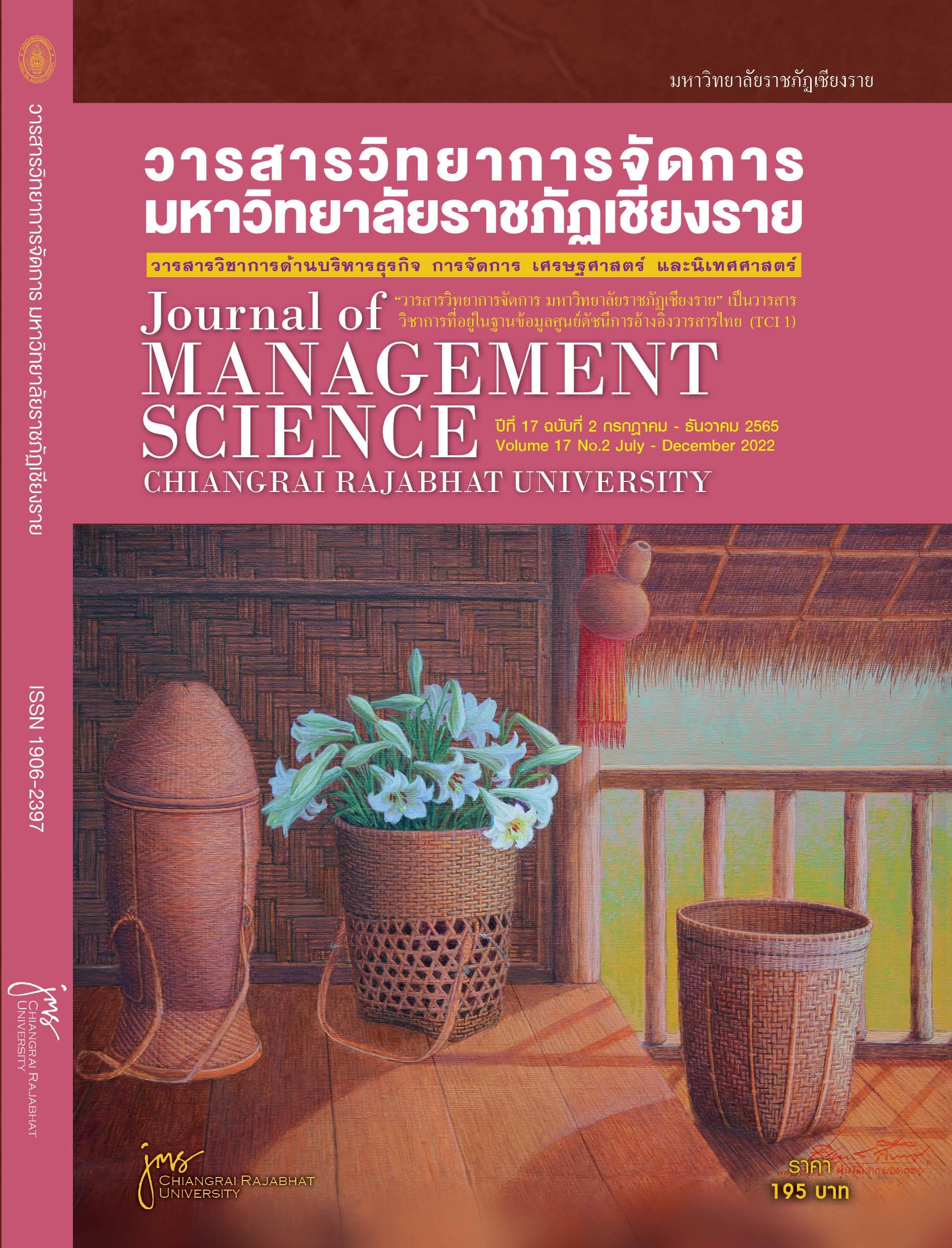The Participatory Management of Small Entrepreneurs for Becoming New Era Entrepreneurs Klongjig Municipality, Bang Pa-in District Ayutthaya Province
Main Article Content
Abstract
The objectives of research were to: 1) study the participatory management of small entrepreneurs classified by customer needs of new era business and 2) create a participatory management approach for new era of small entrepreneurs. Quantitative research and qualitative research were used in this study. The questionnaires were selected from customers who purchase products of use services. The sample were selected by using stratified sampling of type business. The statistics for data analysis were mean, standard deviation and structural equation model (SEM). The focused group and brainstorming stakeholders, who involve in small enterprise management in community, were used for qualitative research. The results found that 1) the need of customers of new era business, the management and participation of small entrepreneurs overall were in a high level. The need of customers of new era business, the management of small entrepreneurs had directly influenced on participatory small entrepreneurs, and 2) the guidelines for becoming new era entrepreneurs comprised of the development of environment, technology, capital and entrepreneurship. The participatory process consists of 1) participating in decision making of officials, academic and customer’s representatives, 2) participating in implementing in order to find out the methods and managing the message, 3) participating in the purchasing benefits from finished goods and services, and 4) participating in evaluating the management.
Article Details

This work is licensed under a Creative Commons Attribution-NonCommercial-NoDerivatives 4.0 International License.
Views and opinions expressed in the journal do not necessarily reflect those of the editors.
References
Bisma, M. A. & Pramudita, A.S. (2021). Business Model Formulation of Social-Commerce Based Influencer on Instagram Platform. Journal Organisasi dan Manajemen. 17(2), 249-264.
Bommel, T., Nijssen, E. J. & Alblas, A. A. (2021). Marketing involvement in product platform creation: The roleof personal and structural coordination mechanisms. Creativity Innovation Management. 30(2), 268-285.
Cohen, J. M., & Uphoff, N. T. (1981). Rural Development Participation: Concept and Measures for Project Design Implementation and Evaluation. New York : Cornell University.
Department of Disease Control. (2020). Guidelines for conducting matters Coronavirus disease 2019 for enterprises. Bangkok : Aksorn Graphic and Design. (in Thai).
DuBrin, A. J. & Ireland, R. D. (1993). Management and organization. 2nded. South-West : Cincinnati.
Fu, Y., Gu, B., Xie, Y., Ye, J., & Cao, B. (2020). Channel structure and differential pricing strategies in dual-channel e-retail considering e-platform business models. IMA Journal of Management Mathematics. 32(1), 91–114.
Greenwood, W. T., Judd, R., & Becker, F. W. (1988). Prepared under the Auspices of the Policy Studies Organization. New York : Greenwood Publishing Group.
Hair, J. F., Black, W. C., Babin, B. J. & Anderson, R. E. (2010). Multivariate Data Analysis. 7thed. NJ : Prentice Hall.
Hsieha, Y.J., & JimWu, Y. (2019). Entrepreneurship through the platform strategy in the digital era: Insights and research opportunities. Computers in Human Behavior. June 2019, 1-40.
Inkson, C., & Minnaert, L. (2012). Tourism Management an introduction. London : SAGE Publication.
Klongjig Municipality. (2021). General condition. Retrieved September 25, 2021, from https://www.klongjig.go.th/condition.php. (in Thai) .
Klongjig Municipality. (2021). Registration certificate of notification. Ayutthaya : Klongjig Municipality. (in Thai)
Klongjig Municipality. (2022). Local Development Plan (2023-2027) of Khlong Chik, Bang Pa-In, Ayutthaya Province. Ayutthaya: Klongjig Municipality. (in Thai).
Kotler, P., Bowen, J. T., & Makens, J. C. (2010). Marketing for Hospitality and Tourism. 5th ed. New Jersey : Pearson.
Lampadarios, E. (2016). Critical Success Factors for SMEs: An Empirical Study in the UK Chemical Distribution Industry. International Journal of Business Management. 1(7), 67-82.
Nair, J., Chellasamy, A. & Singh, B.N. (2019). Readiness factors for information technology adoption in SMEs: testing an exploratory model in an Indian context. Journal of Asia Business Studies. 13(4), 694-718.
Nwaiwu, F., Duduci, M., Chromjakova, F. & Otekhile, C. F. (2019). Industry 4.0 concepts within the Czech SME manufacturing sector: an empirical assessment of critical success factors. Verslas: Teorija ir praktika/Business: Theory and Practice. 21(1), 58–70.
Nyoni, T., & Bonga, W. G. (2018). Anatomy of the Small & Medium Enterprises (SMEs) Critical Success Factors (CSFs) in Zimbabwe: Introducing the 3E Model. Dynamic Research Journals, 1(2), 1-18.
Offei, I., Kissi, E. & Nani, G. (2019). Factors Affecting the Capacity of Small to Medium Enterprises (SME) Building Construction Firms in Ghana. Journal of Construction in Developing Countries. 24(1), 49–63.
Photimanee, K., Khumprasert, K., Plomelersee, S., & Chankoung, P. (2022). Fresh Market Management that Corresponds to the Needs of Trading Partners and Customers in the New Normal Era: The Case Study of Ying Charoen Market. Bangkok : Phranakhon Rajabhat University. (in Thai).
Rajamangala University of Technology Thanyaburi. (2013). Principles of Management and Organization. Bangkok : Triple Education. (in Thai).
Sektrakul, K. (2020). Entrepreneur's Class. Bangkok: The Stock Exchange of Thailand. (in Thai).
Vajanasawas, K. (2007). Public participation in the implementation of government policies Employment service. Bangkok: Department of Employment. (in Thai).


